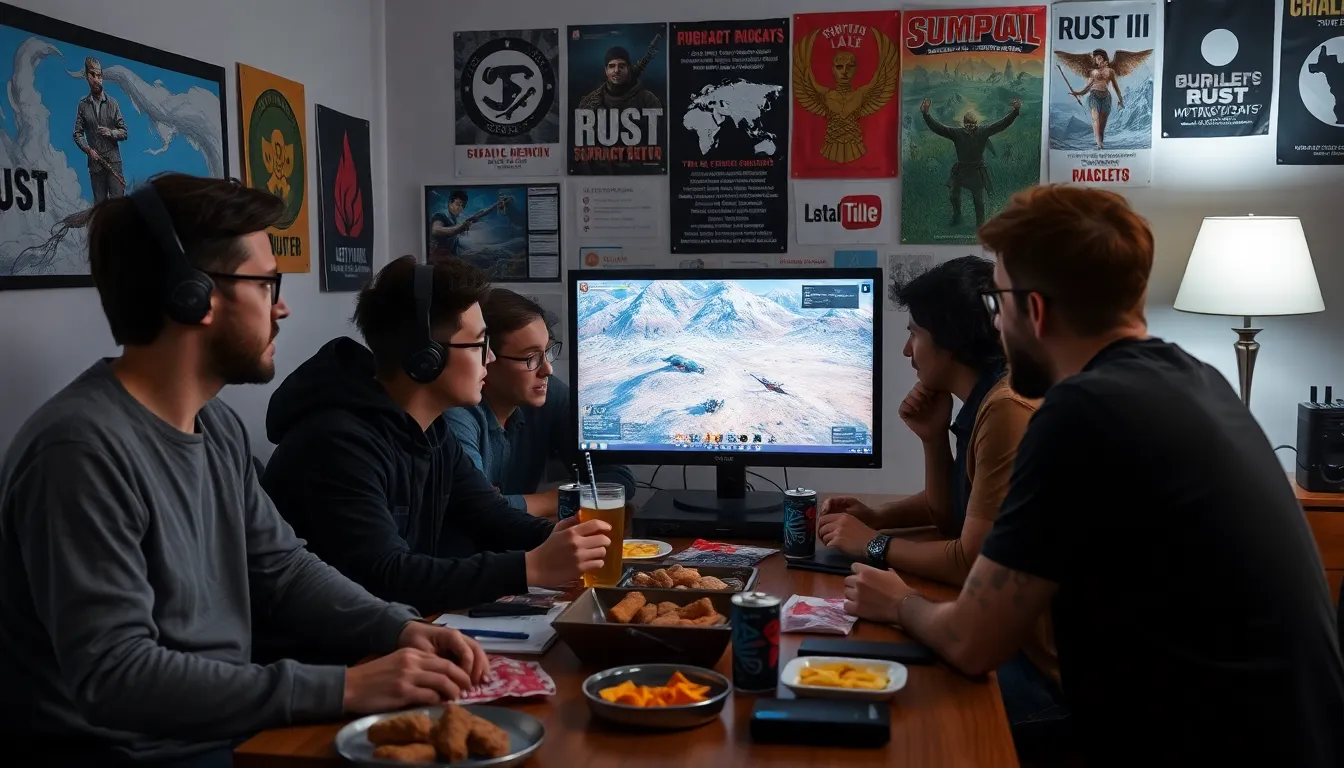Table of Contents
ToggleIn the chaotic world of Rust, survival isn’t just about gathering resources and building a fortress; it’s also about making a name for yourself. With every raid and encounter, players navigate a ruthless landscape where rankings can make or break reputations faster than a poorly-timed campfire. Whether you’re a seasoned veteran or a fresh-faced newbie, understanding the ins and outs of Rust game ranking can give you the edge you need to dominate the competition.
Imagine strutting into a server, not just as another survivor but as a top-ranked legend. That’s the dream, right? This article dives into the nitty-gritty of Rust rankings, helping players climb the ladder while keeping their sense of humor intact. Get ready to laugh, learn, and maybe even shed a tear over those unfortunate moments when you thought you were invincible—only to find yourself staring at the respawn screen.
Overview of Rust Game Ranking
Rust game ranking reflects a player’s skill and reputation within the community. Players gain ranks through various activities like successful raids, crafting impressive bases, and engaging in combat. Consistent performance contributes to a player’s rise in the ranks.
Understanding the ranking system assists players in setting achievable goals. New players grasp the competitive nature early on, while experienced players can strategize to maintain or improve their standings. Tracking rank changes offers insights into personal and group dynamics.
Rankings are influenced by several factors, including kills, deaths, and how often players gather resources. Teams that excel in these areas often secure higher ranks. Players can also face setbacks, making resilience essential for navigating the competitive landscape.
Communication among teammates plays a significant role in ranking. Coordinated efforts lead to resource gathering, effective defense strategies, and successful raids. Teams with strong communication skills often outperform others with lower engagement levels.
Regularly reviewing performance through in-game metrics enhances a player’s understanding of their strengths and weaknesses. Resources such as community forums and guides provide valuable tips to help boost rank. Focusing on improving individual and team performance drives success in the Rust community.
Factors Influencing Rust Game Ranking

Game ranking in Rust hinges on multiple factors. Effective gameplay mechanics and community engagement significantly impact a player’s position.
Gameplay Mechanics
Skillful execution of gameplay mechanics affects ranking. The number of kills, deaths, and successful resource gathering directly reflects a player’s capabilities. Players achieve higher ranks through strategic combat and effective base building. Consistent performance across different scenarios enhances reputation. Mastering weapon handling and understanding game physics play a vital role in improving results. Players who adapt quickly to changing situations often find themselves at the top of the ranking charts. Utilizing tools and understanding inventory management further augments gameplay efficiency.
Community Engagement
Active participation in the Rust community significantly influences rankings. Players who collaborate with teammates and engage in communication foster better strategies. Forming alliances often leads to successful raids and increased resource acquisition. Contributions to community discussions enhance knowledge sharing, which can elevate player skills. Actively seeking feedback from peers aids in identifying strengths and weaknesses. Participating in community events or competitions can also boost reputation, providing external recognition of skill level. Building a positive reputation through interaction ultimately solidifies a player’s standing in the game.
Popular Rankings and Reviews
Understanding player-driven rankings and professional evaluations is essential for grasping the competitive scope within Rust.
User-Generated Rankings
Community-based rankings often reflect real player experiences and preferences. Players frequently contribute to platforms like Steam and Reddit, sharing feedback on server quality and gameplay dynamics. These user-generated votes shine a light on the most popular servers and play styles. Rankings can shift rapidly; they adapt to frequent updates and changes in gameplay. As players provide insights, they help others identify which servers are thriving or struggling. Peer recommendations offer valuable guidance to newcomers seeking engaging environments.
Professional Reviews
Critics evaluate Rust through in-depth assessments, focusing on gameplay mechanics, graphics, and community interactions. Websites like IGN and GameSpot deliver comprehensive critiques that highlight strengths and weaknesses. These professional reviews assess updates and expansions, influencing player perceptions. Ratings often incorporate factors such as user engagement and community events. A collective rating from multiple reviews can shape the understanding of Rust’s overall quality. Players benefit from these structured analyses, allowing them to make informed decisions about their gaming experience.
Comparison with Other Survival Games
Rust distinguishes itself in the survival game genre through its intense PvP combat and base-building mechanics. Other popular titles, such as ARK: Survival Evolved and seven days to die, focus on crafting and resource management but often lack the same competitive edge. Players in Rust experience a more immersive environment where PvP encounters are frequent and brutal.
Several games emphasize story-driven content, while Rust prioritizes player interactions and community dynamics. This focus brings unique challenges; players must negotiate alliances and adapt strategies on the fly. Unlike many survival games that offer curated experiences, Rust thrives on its unpredictable community-driven scenarios, where cooperation can quickly turn into conflict.
Resource gathering plays a pivotal role in both Rust and similar games. However, Rust’s fast-paced gameplay demands quicker decision-making and more strategic planning. Players secure resources not only for survival but also to gain advantages over opponents. Rankings reflect this strategic depth as performance metrics include not just kills and deaths, but also resource acquisition and base fortification.
Community feedback highlights another aspect where Rust excels compared to its competitors. The dedicated player community offers essential insights into server health and gameplay experiences. This level of engagement enhances the collective understanding of game dynamics. Platforms like Steam and Reddit provide forums for discussions that shape player expectations and experiences.
In comparing Rust to games like DayZ, differences in combat systems become evident. Rust features a more refined weapon handling and building system which influences player tactics. These mechanics contribute significantly to rankings, where consistent gameplay determines success. Overall, each survival game presents unique challenges, yet Rust’s blend of competitiveness and community creates a distinct experience within the genre.
Mastering the ranking system in Rust is essential for players aiming to enhance their gaming experience. By focusing on skillful gameplay and community engagement, players can significantly improve their standings. Understanding the factors that influence rankings empowers players to set realistic goals and adapt strategies effectively.
As players navigate the challenges of survival and competition, they should remember that consistent performance and teamwork are key. Engaging with the community not only fosters better gameplay but also enriches the overall experience. Embracing the ups and downs of the ranking journey ultimately leads to personal growth and a deeper appreciation for the dynamic world of Rust.










